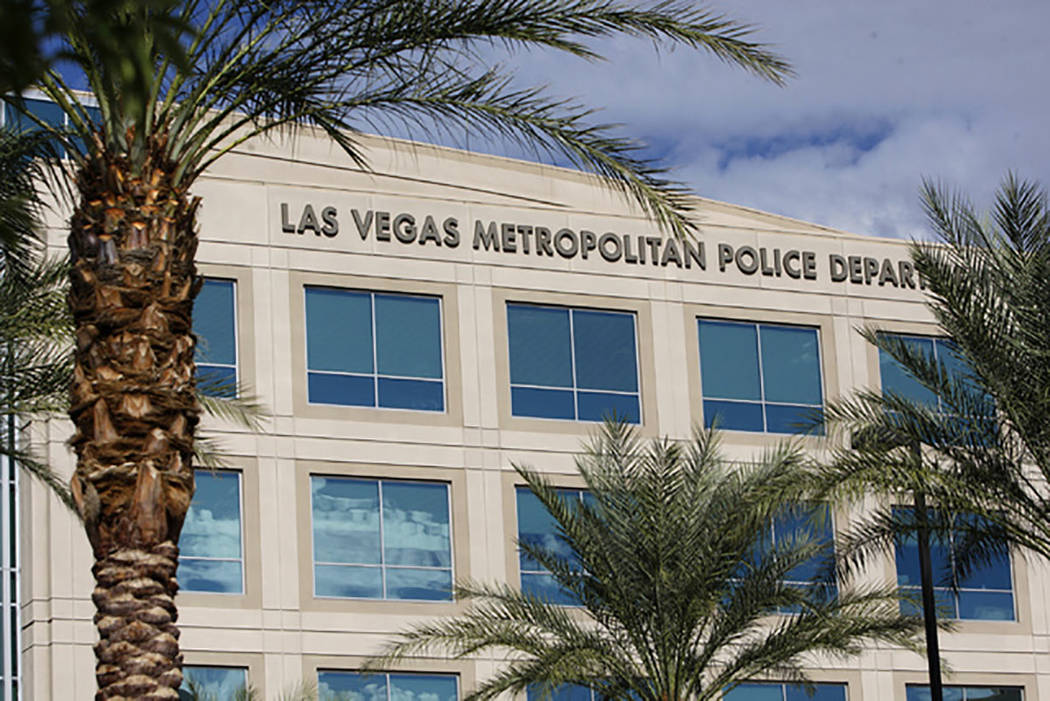How Las Vegas Metro police kept sex trafficking records under wraps
Seven hundred forty-five days.
As of Sunday, that’s how long the Review-Journal has been battling the Metropolitan Police Department for sex trafficking and prostitution records.
The fight began with public records requests. Las Vegas is regarded as a hot spot for trafficking and prostitution, so the newspaper wanted to know how local police were responding. In February 2017, a reporter began asking for arrest reports, investigative files and other documents.
Metro responded with endless rounds of arguments, obfuscation and outright refusals.
In May 2018, the Review-Journal sued. Metro has since provided some documents — after being chastised by the court. But the case is still ongoing and several of the most critical records have yet to be released.
“It’s important for Nevadans to understand that in many other states, these kinds of records are available to anyone and everyone, no questions asked,” Review-Journal Executive Editor Glenn Cook said. “It should be the same in Nevada, but Metro takes the position that the public doesn’t need to know how it enforces laws intended to combat a growing national problem with devastating consequences for young victims.”
Metro declined to comment for this story. In court, lawyers representing the agency have argued that searching for the requested records is difficult and that the newspaper should bear the costs associated with locating them.
Sunshine Week kickoff
The Review-Journal is highlighting this dispute because Sunday marks the kickoff of Sunshine Week, an annual observance of the public’s right to documents and information about their governments. Over the next several days, the Review-Journal will join news outlets across the country in underscoring the use of critical state and federal laws to obtain government records that provide visibility and accountability for taxpayers.
In Nevada, many governments and agencies ignore the state’s public records law, often without penalty and untold costs to taxpayers. The Review-Journal will use Sunshine Week to spotlight some of those cases, starting with its lawsuit against Metro.
In August, at the lawsuit’s first hearing, District Judge Joe Hardy Jr. said Metro’s reaction to the Review-Journal’s requests “boggles my mind” and added that the department “has not complied or even come close to compliance” with the state’s public records law. The judge subsequently ordered a Metro representative to discuss the Review-Journal’s requests with the newspaper and its attorneys.
Instead, Metro fought the judge’s order and filed an emergency petition with the Nevada Supreme Court to prevent the meeting.
In January, the Supreme Court unanimously rejected Metro’s petition, which forced the department to meet with Review-Journal representatives. That long-awaited meeting occurred last month, at the law offices of Marquis Aurbach Coffing, a private firm the department hired to handle the newspaper’s sex trafficking requests.
At the meeting, the department’s representative and attorneys said they didn’t know the answers to the Review-Journal’s questions or would have to get back to the newspaper at least 12 times.
‘Brutal irony’
“The public needs to understand the brutal irony of this unfortunate situation,” Cook said. “A judge determines the police are breaking the law and orders them to come to the table to work out how they will release public information. The police, who are charged with upholding the law, refused to follow the Public Records Act. Then they fought efforts to get them to comply.”
“Taxpayers are paying untold thousands of dollars in legal bills to help police avoid producing records and block scrutiny of their operations,” Cook said. “Police are not supposed to be above the law.”
Metro began slowly releasing prostitution arrest records in September, but the department has yet to provide the full scope of investigative files requested. Judge Hardy is expected to make some rulings on the case soon.
“While I’m glad Metro is now producing some records, it’s ridiculous that it took so long and was so difficult,” Review-Journal attorney Maggie McLetchie said. “Rather than throwing up roadblocks and engaging in expensive, protracted litigation, public agencies should work cooperatively with requesters to facilitate transparency — and avoid waste of public funds.”
Cook said the unlawful lack of compliance with the Nevada Public Records Act prevents the public from learning all kinds of things about the operations and efficiency of government agencies.
“Want to know whether the coroner’s investigations are thorough? Or whether an agency is helping senior employees spike their pensions? Or how much government workers spend on travel? Or why some schools have terrific achievement but others don’t? Public records can answer these questions,” Cook said. “But government agencies routinely refuse to provide these records even though Nevada law says they must. This has to change.”
Contact Brian Joseph at bjoseph@reviewjournal.com or 702-387-5208. Follow @bjoseph1 on Twitter.


















